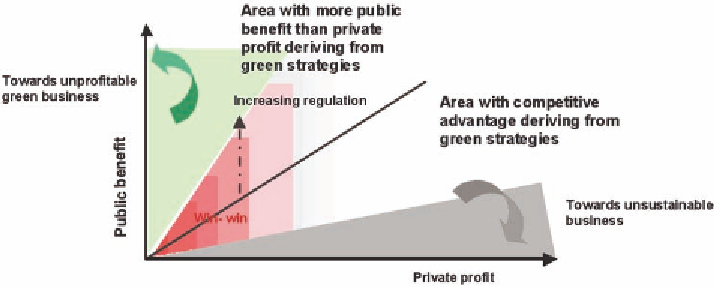Environmental Engineering Reference
In-Depth Information
Figure 1. Scope for environmental strategies; adapted from Orsato (2009)
pro-active strategies, in response to what they con-
sider the scope of the comparative advantage they
can benefit from these strategies implementation.
Thus there are some window of opportunity
to meet both public benefit and private profit,
but these models of activities or innovations
will highly depend on the internal and external
context of each organization. If opportunities
are reachable for all business types, internal and
external circumstances will largely influence their
capacity to capture them and according to their
specificities, each company will define the scope
of its environmental action, more or less close to
the vertical axis in Figure 1.
There is no single theory to establish the infal-
lible rule that may lead to a sustainable and
profitable green strategy or to isolate uncondi-
tional “win-win” strategies. Being green does not
always create value as many factors will intervene
in the conditions to succeed. The creation of
economic value and the extent to which the busi-
nesses may reintegrate environmental concerns
in their activities may depend on these green in-
novations to meet shareholder's expectations or
the capacity of the business to change these ex-
pectations and impact their boarder context if the
green innovation does not meet their short term
criteria.
Some strategic decisions are not only justified
by economic profitability, as a green strategy may
also end up with positive however intangible ef-
fects and be an empirical justification to implement
it. These returns are usually difficult to disentangle
and to quantify ex ante. But this leaves room for
the managers to impose their vision of the future.
FRAMING THE CONDITIONS
FOR A LOW CARBON FUTURE
Issues and Methodology
Beyond some success stories, the question here
is how these business models are keen to emerge
and be generalized for they become the norm and
shape a new economy paradigm. The vision of the
future, the ended point, seems highly important
in this discussion. There is a new momentum, in
politics, business and society where environmen-
tal concern start to be understood as an holistic
problem and envisaged as a prerequisite to sustain
livable, even more equitable, society in the future.
Finite resources start to be a concern, be strategic
(energy for instance) or the preconditions for
geopolitical stability (limiting global warming).
The Copenhagen Accord obtained in December
2009 provides a sign that all nations recognize
these challenges and agree to comply with the
adoption of national strategies to limit global
warming. However, the multilateral agreement is

